Roberts A.D. The Cambridge History of Africa, Volume 7: from 1905 to 1940
Подождите немного. Документ загружается.

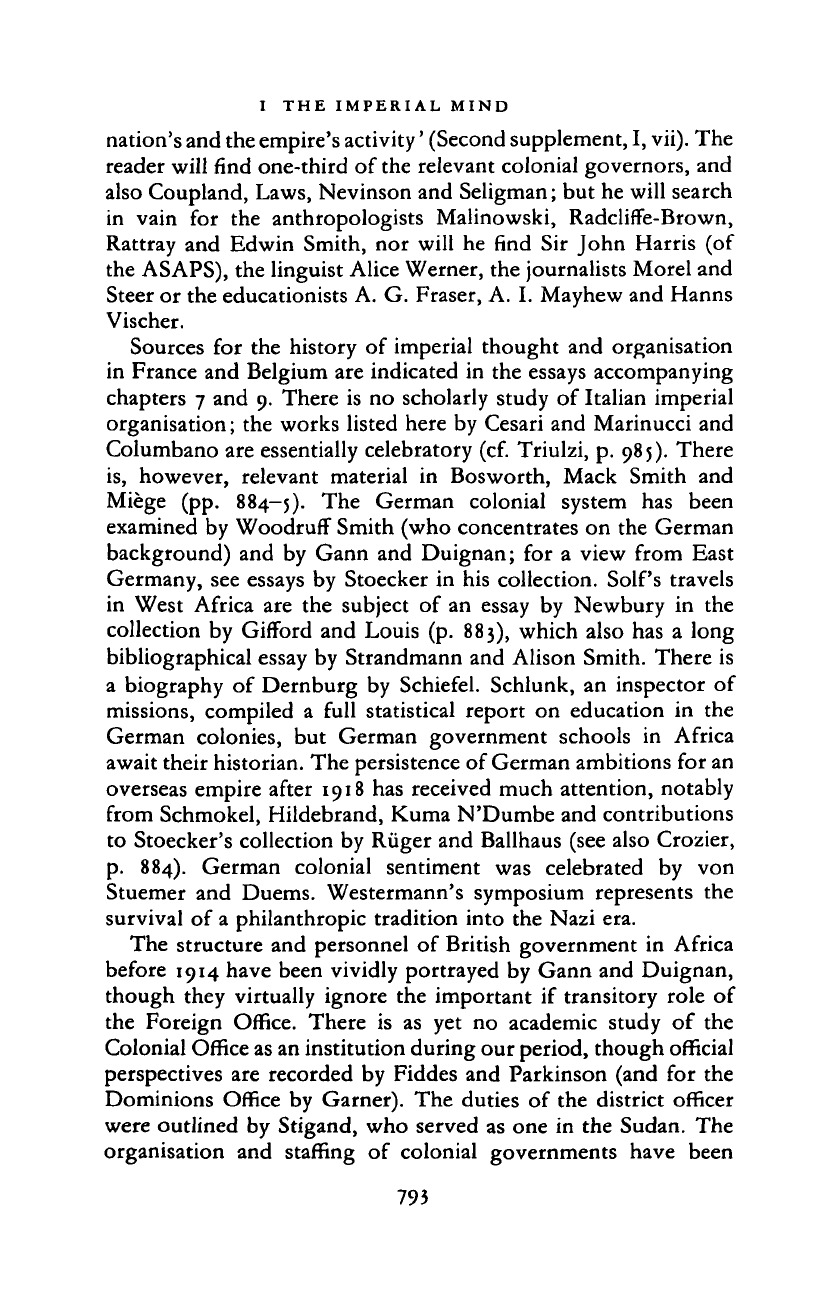
I THE IMPERIAL MIND
nation's and the empire's activity' (Second supplement, I,
vii).
The
reader will find one-third of the relevant colonial governors, and
also Coupland, Laws, Nevinson and Seligman; but he will search
in vain
for the
anthropologists Malinowski, Radcliffe-Brown,
Rattray and Edwin Smith, nor will he find Sir John Harris (of
the ASAPS), the linguist Alice Werner, the journalists Morel and
Steer or the educationists A. G. Fraser, A. I. Mayhew and Hanns
Vischer.
Sources for the history
of
imperial thought and organisation
in France and Belgium are indicated in the essays accompanying
chapters 7 and 9. There is no scholarly study of Italian imperial
organisation; the works listed here by Cesari and Marinucci and
Columbano are essentially celebratory (cf. Triulzi, p. 985). There
is,
however, relevant material
in
Bosworth, Mack Smith and
Miege
(pp.
884—5).
The
German colonial system
has
been
examined by Woodruff Smith (who concentrates on the German
background) and by Gann and Duignan; for
a
view from East
Germany, see essays by Stoecker in his collection. Solf's travels
in West Africa are the subject
of
an essay
by
Newbury
in the
collection by Gifford and Louis (p. 883), which also has
a
long
bibliographical essay by Strandmann and Alison Smith. There is
a biography
of
Dernburg by Schiefel. Schlunk, an inspector of
missions, compiled
a
full statistical report
on
education
in the
German colonies,
but
German government schools
in
Africa
await their historian. The persistence of German ambitions for an
overseas empire after 1918 has received much attention, notably
from Schmokel, Hildebrand, Kuma N'Dumbe and contributions
to Stoecker's collection by Riiger and Ballhaus (see also Crozier,
p.
884). German colonial sentiment
was
celebrated
by von
Stuemer and Duems. Westermann's symposium represents
the
survival of a philanthropic tradition into the Nazi era.
The structure and personnel
of
British government
in
Africa
before 1914 have been vividly portrayed by Gann and Duignan,
though they virtually ignore the important
if
transitory role of
the Foreign Office. There
is as yet no
academic study
of
the
Colonial Office as an institution during our period, though official
perspectives are recorded by Fiddes and Parkinson (and for the
Dominions Office by Garner). The duties
of
the district officer
were outlined by Stigand, who served as one in the Sudan. The
organisation
and
staffing
of
colonial governments have been
793
Cambridge Histories Online © Cambridge University Press, 2008
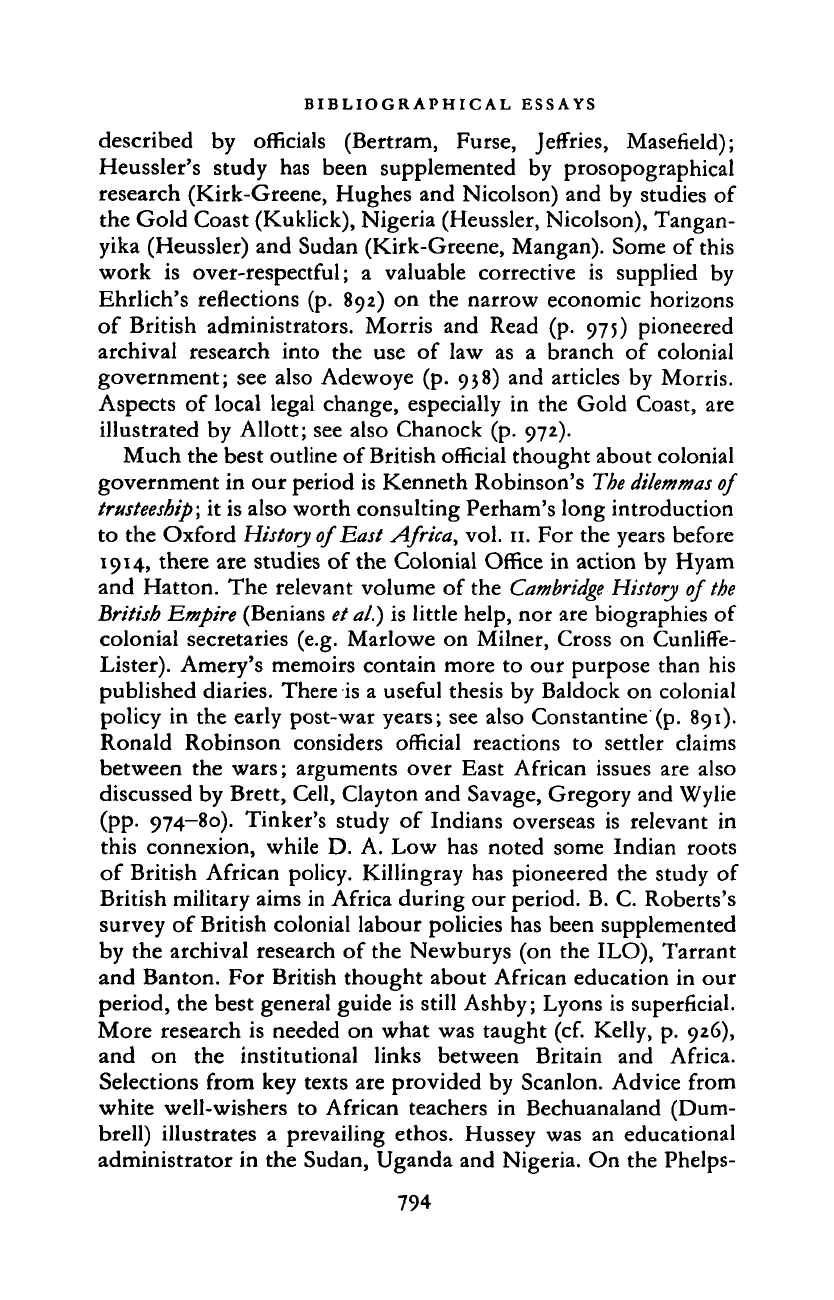
BIBLIOGRAPHICAL ESSAYS
described
by
officials (Bertram, Furse, Jeffries, Masefield);
Heussler's study has been supplemented
by
prosopographical
research (Kirk-Greene, Hughes and Nicolson) and by studies of
the Gold Coast (Kuklick), Nigeria (Heussler, Nicolson), Tangan-
yika (Heussler) and Sudan (Kirk-Greene, Mangan). Some of this
work
is
over-respectful;
a
valuable corrective
is
supplied
by
Ehrlich's reflections (p. 892) on the narrow economic horizons
of British administrators. Morris and Read (p. 975) pioneered
archival research into the use
of
law
as a
branch
of
colonial
government; see also Adewoye (p. 938) and articles by Morris.
Aspects of local legal change, especially
in
the Gold Coast, are
illustrated by Allott; see also Chanock (p. 972).
Much the best outline of British official thought about colonial
government in our period is Kenneth Robinson's
The dilemmas of
trusteeship;
it is also worth consulting Perham's long introduction
to the Oxford
History
of East Africa, vol.
11.
For the years before
1914,
there are studies of the Colonial Office in action by Hyam
and Hatton. The relevant volume of the
Cambridge History
of
the
British Empire (Benians et
al.)
is little help, nor are biographies of
colonial secretaries (e.g. Marlowe on Milner, Cross on Cunliffe-
Lister).
Amery's memoirs contain more to our purpose than his
published diaries. There is a useful thesis by Baldock on colonial
policy in the early post-war years; see also Constantine (p. 891).
Ronald Robinson considers official reactions
to
settler claims
between the wars; arguments over East African issues are also
discussed by Brett, Cell, Clayton and Savage, Gregory and Wylie
(pp.
974-80). Tinker's study
of
Indians overseas
is
relevant
in
this connexion, while D. A. Low has noted some Indian roots
of British African policy. Killingray has pioneered the study of
British military aims in Africa during our period. B. C. Roberts's
survey of British colonial labour policies has been supplemented
by the archival research of the Newburys (on the ILO), Tarrant
and Banton. For British thought about African education in our
period, the best general guide is still Ashby; Lyons is superficial.
More research is needed on what was taught (cf. Kelly, p. 926),
and
on the
institutional links between Britain
and
Africa.
Selections from key texts are provided by Scanlon. Advice from
white well-wishers to African teachers
in
Bechuanaland (Dum-
brell) illustrates
a
prevailing ethos. Hussey was an educational
administrator in the Sudan, Uganda and Nigeria. On the Phelps-
794
Cambridge Histories Online © Cambridge University Press, 2008
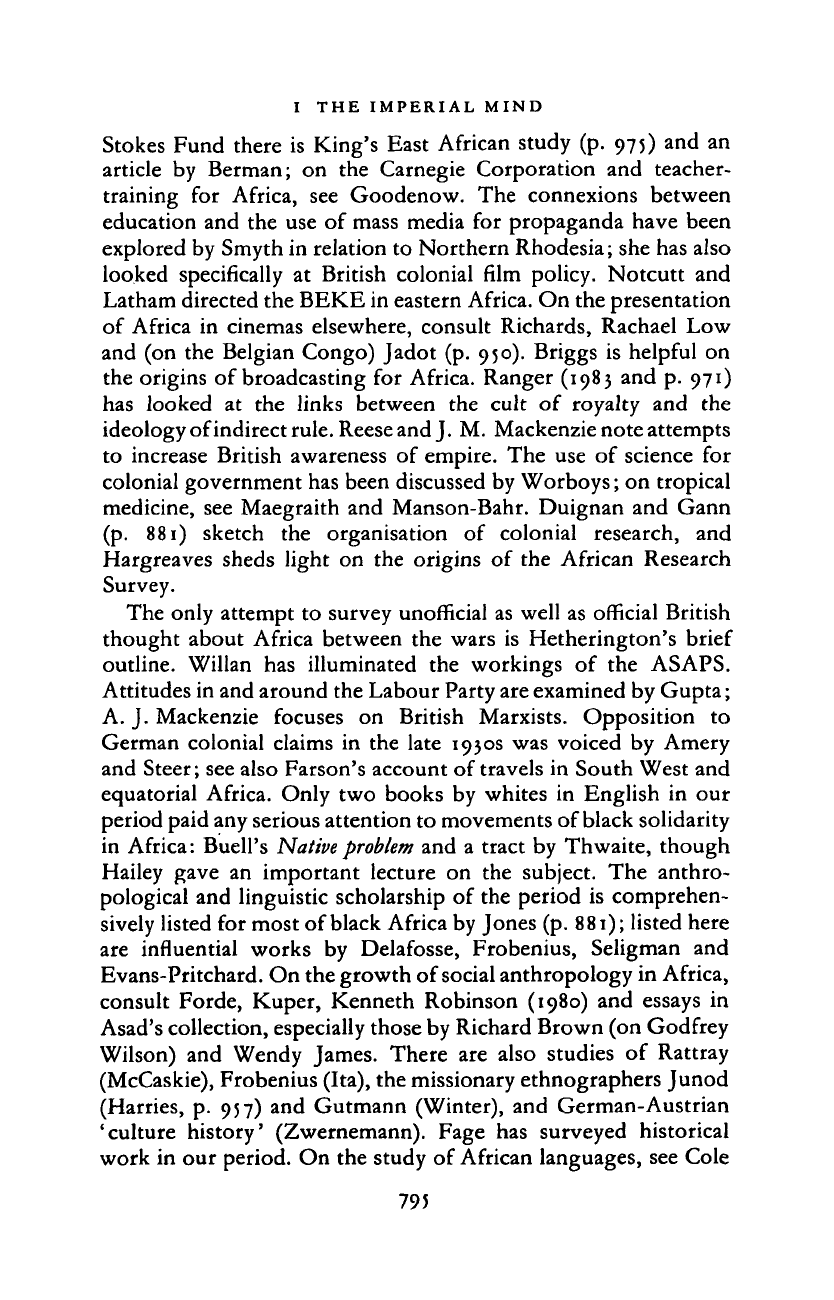
I THE IMPERIAL MIND
Stokes Fund there is King's East African study (p. 975) and an
article
by
Berman;
on the
Carnegie Corporation and teacher-
training
for
Africa,
see
Goodenow. The connexions between
education and the use of mass media for propaganda have been
explored by Smyth in relation to Northern Rhodesia; she has also
looked specifically
at
British colonial film policy. Notcutt and
Latham directed the BEKE in eastern Africa. On the presentation
of Africa
in
cinemas elsewhere, consult Richards, Rachael Low
and (on the Belgian Congo) Jadot (p. 950). Briggs is helpful on
the origins of broadcasting for Africa. Ranger (1983 and p. 971)
has looked
at the
links between
the
cult
of
royalty
and the
ideology of indirect
rule.
Reese and J. M. Mackenzie note attempts
to increase British awareness
of
empire. The use
of
science
for
colonial government has been discussed by Worboys; on tropical
medicine, see Maegraith and Manson-Bahr. Duignan and Gann
(p.
881)
sketch
the
organisation
of
colonial research,
and
Hargreaves sheds light on the origins
of
the African Research
Survey.
The only attempt to survey unofficial as well as official British
thought about Africa between the wars
is
Hetherington's brief
outline. Willan
has
illuminated
the
workings
of
the ASAPS.
Attitudes in and around the Labour Party are examined by Gupta;
A. J. Mackenzie focuses
on
British Marxists. Opposition
to
German colonial claims
in
the late 1930s was voiced by Amery
and Steer; see also Farson's account of travels in South West and
equatorial Africa. Only two books by whites
in
English
in
our
period paid any serious attention to movements of black solidarity
in Africa: BuelPs
Native problem
and a tract by Thwaite, though
Hailey gave
an
important lecture
on
the subject. The anthro-
pological and linguistic scholarship of the period is comprehen-
sively listed for most of black Africa by Jones (p. 881); listed here
are influential works
by
Delafosse, Frobenius, Seligman
and
Evans-Pritchard. On the growth of social anthropology in Africa,
consult Forde, Kuper, Kenneth Robinson (1980) and essays
in
Asad's collection, especially those by Richard Brown (on Godfrey
Wilson) and Wendy James. There are also studies
of
Rattray
(McCaskie), Frobenius (Ita), the missionary ethnographers Junod
(Harries, p. 957) and Gutmann (Winter), and German-Austrian
'culture history' (Zwernemann). Fage has surveyed historical
work in our period. On the study of African languages, see Cole
795
Cambridge Histories Online © Cambridge University Press, 2008
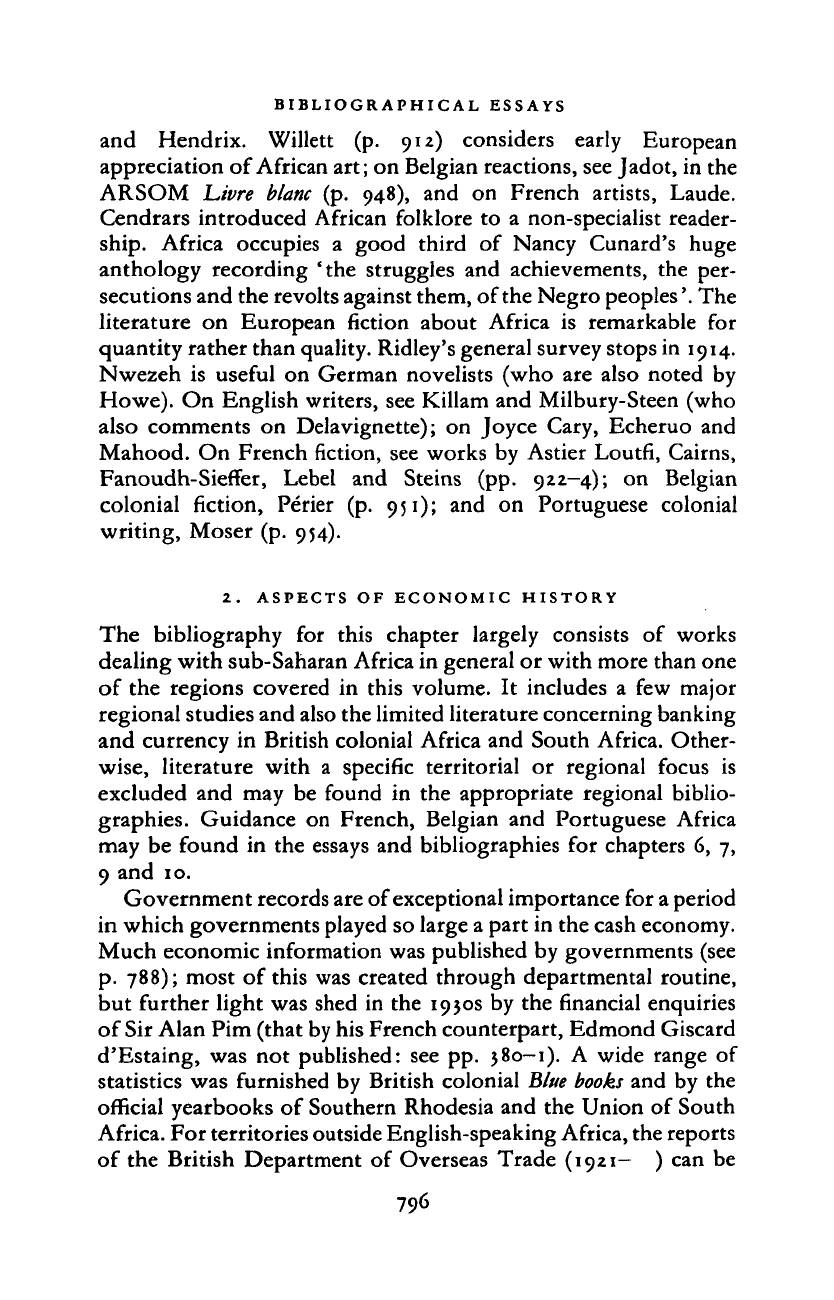
BIBLIOGRAPHICAL ESSAYS
and Hendrix. Willett
(p. 912)
considers early European
appreciation of African art; on Belgian reactions, see Jadot, in the
ARSOM L.ivre
blanc
(p. 948),
and on
French artists, Laude.
Cendrars introduced African folklore to
a
non-specialist reader-
ship.
Africa occupies
a
good third
of
Nancy Cunard's huge
anthology recording 'the struggles and achievements, the per-
secutions and the revolts against them, of the Negro peoples'. The
literature
on
European fiction about Africa
is
remarkable
for
quantity rather than quality. Ridley's general survey stops in 1914.
Nwezeh
is
useful on German novelists (who are also noted
by
Howe).
On English writers, see Killam and Milbury-Steen (who
also comments
on
Delavignette);
on
Joyce Cary, Echeruo and
Mahood. On French fiction, see works by Astier Loutfi, Cairns,
Fanoudh-Sieffer, Lebel
and
Steins
(pp.
922-4);
on
Belgian
colonial fiction, Perier
(p.
951);
and on
Portuguese colonial
writing, Moser (p. 954).
2.
ASPECTS OF ECONOMIC HISTORY
The bibliography
for
this chapter largely consists
of
works
dealing with sub-Saharan Africa in general or with more than one
of the regions covered
in
this volume.
It
includes
a
few major
regional studies and also the limited literature concerning banking
and currency in British colonial Africa and South Africa. Other-
wise,
literature with
a
specific territorial
or
regional focus
is
excluded and may be found
in
the appropriate regional biblio-
graphies. Guidance
on
French, Belgian and Portuguese Africa
may be found
in
the essays and bibliographies for chapters 6,
7,
9 and 10.
Government records are of exceptional importance for a period
in which governments played so large a part in the cash economy.
Much economic information was published by governments (see
p.
788); most of this was created through departmental routine,
but further light was shed in the 1950s by the financial enquiries
of Sir Alan Pim (that by his French counterpart, Edmond Giscard
d'Estaing, was not published: see pp. 380-1).
A
wide range
of
statistics was furnished by British colonial
Blue books
and by the
official yearbooks of Southern Rhodesia and the Union of South
Africa. For territories outside English-speaking Africa, the reports
of the British Department
of
Overseas Trade
(1921-
)
can be
796
Cambridge Histories Online © Cambridge University Press, 2008
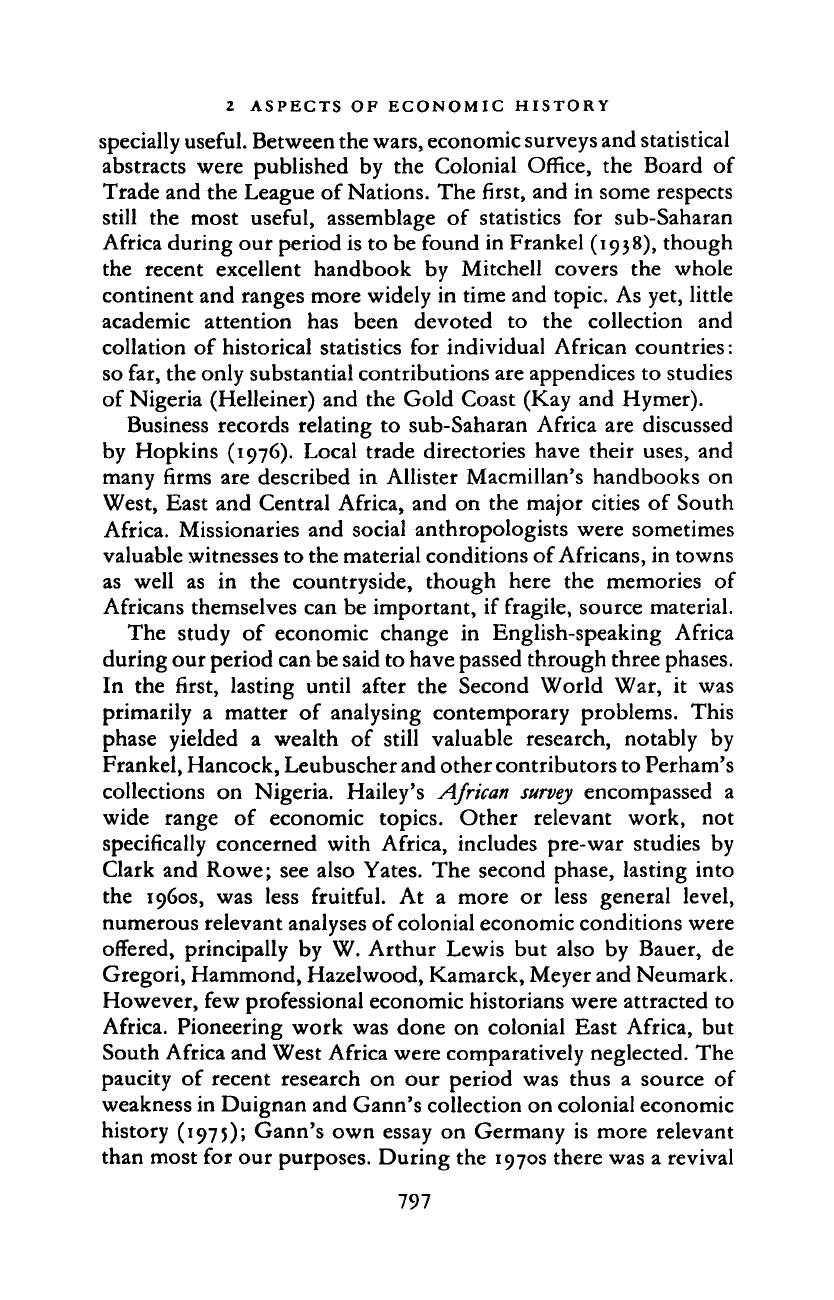
2 ASPECTS OF ECONOMIC HISTORY
specially useful. Between the
wars,
economic surveys and statistical
abstracts were published
by
the Colonial Office,
the
Board
of
Trade and the League of Nations. The first, and in some respects
still
the
most useful, assemblage
of
statistics
for
sub-Saharan
Africa during our period is to be found in Frankel (1938), though
the recent excellent handbook
by
Mitchell covers
the
whole
continent and ranges more widely in time and topic. As yet, little
academic attention
has
been devoted
to the
collection
and
collation
of
historical statistics for individual African countries:
so far, the only substantial contributions are appendices to studies
of Nigeria (Helleiner) and the Gold Coast (Kay and Hymer).
Business records relating
to
sub-Saharan Africa are discussed
by Hopkins (1976). Local trade directories have their uses, and
many firms are described
in
Allister Macmillan's handbooks on
West, East and Central Africa, and on the major cities
of
South
Africa. Missionaries and social anthropologists were sometimes
valuable witnesses to the material conditions of Africans, in towns
as well
as in the
countryside, though here
the
memories
of
Africans themselves can be important, if fragile, source material.
The study
of
economic change
in
English-speaking Africa
during our period can be said to have passed through three phases.
In
the
first, lasting until after the Second World War,
it
was
primarily
a
matter
of
analysing contemporary problems. This
phase yielded
a
wealth
of
still valuable research, notably
by
Frankel, Hancock, Leubuscher and other contributors to Perham's
collections
on
Nigeria. Hailey's African
survey
encompassed
a
wide range
of
economic topics. Other relevant work,
not
specifically concerned with Africa, includes pre-war studies
by
Clark and Rowe; see also Yates. The second phase, lasting into
the 1960s, was less fruitful.
At a
more
or
less general level,
numerous relevant analyses of colonial economic conditions were
offered, principally
by
W. Arthur Lewis but also
by
Bauer,
de
Gregori, Hammond, Hazelwood, Kamarck, Meyer and Neumark.
However, few professional economic historians were attracted to
Africa. Pioneering work was done on colonial East Africa, but
South Africa and West Africa were comparatively neglected. The
paucity
of
recent research
on
our period was thus
a
source
of
weakness in Duignan and Gann's collection on colonial economic
history (1975); Gann's own essay on Germany
is
more relevant
than most for our purposes. During the 1970s there was a revival
797
Cambridge Histories Online © Cambridge University Press, 2008
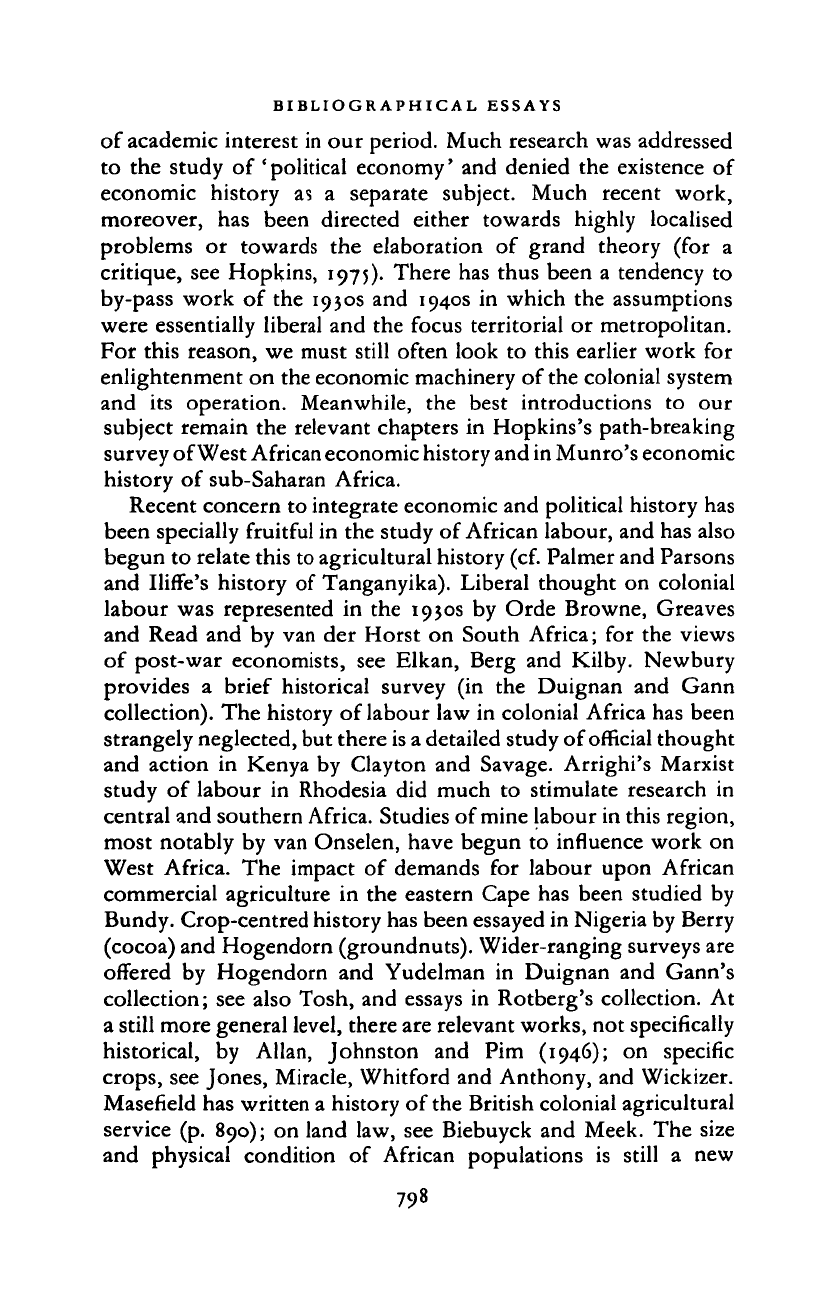
BIBLIOGRAPHICAL ESSAYS
of academic interest in our period. Much research was addressed
to the study
of
' political economy' and denied the existence of
economic history
as a
separate subject. Much recent work,
moreover,
has
been directed either towards highly localised
problems
or
towards
the
elaboration
of
grand theory
(for a
critique, see Hopkins, 1975). There has thus been
a
tendency
to
by-pass work
of
the 1930s and 1940s in which the assumptions
were essentially liberal and the focus territorial or metropolitan.
For this reason, we must still often look to this earlier work for
enlightenment on the economic machinery of the colonial system
and
its
operation. Meanwhile,
the
best introductions
to our
subject remain the relevant chapters in Hopkins's path-breaking
survey of West African economic history and in Munro's economic
history of sub-Saharan Africa.
Recent concern to integrate economic and political history has
been specially fruitful in the study of African labour, and has also
begun to relate this to agricultural history (cf. Palmer and Parsons
and Iliffe's history of Tanganyika). Liberal thought on colonial
labour was represented
in
the 1930s by Orde Browne, Greaves
and Read and by van der Horst on South Africa; for the views
of post-war economists, see Elkan, Berg and Kilby. Newbury
provides
a
brief historical survey
(in the
Duignan and Gann
collection). The history of labour law in colonial Africa has been
strangely neglected, but there is a detailed study of official thought
and action
in
Kenya by Clayton and Savage. Arrighi's Marxist
study
of
labour
in
Rhodesia did much
to
stimulate research
in
central and southern Africa. Studies of mine labour in this region,
most notably by van Onselen, have begun to influence work on
West Africa. The impact
of
demands
for
labour upon African
commercial agriculture in the eastern Cape has been studied by
Bundy. Crop-centred history has been essayed in Nigeria by Berry
(cocoa) and Hogendorn (groundnuts). Wider-ranging surveys are
offered
by
Hogendorn and Yudelman
in
Duignan and Gann's
collection; see also Tosh, and essays in Rotberg's collection. At
a still more general level, there are relevant works, not specifically
historical,
by
Allan, Johnston
and
Pirn (1946);
on
specific
crops,
see Jones, Miracle, Whitford and Anthony, and Wickizer.
Masefield has written a history of the British colonial agricultural
service (p. 890); on land law, see Biebuyck and Meek. The size
and physical condition
of
African populations
is
still
a
new
798
Cambridge Histories Online © Cambridge University Press, 2008
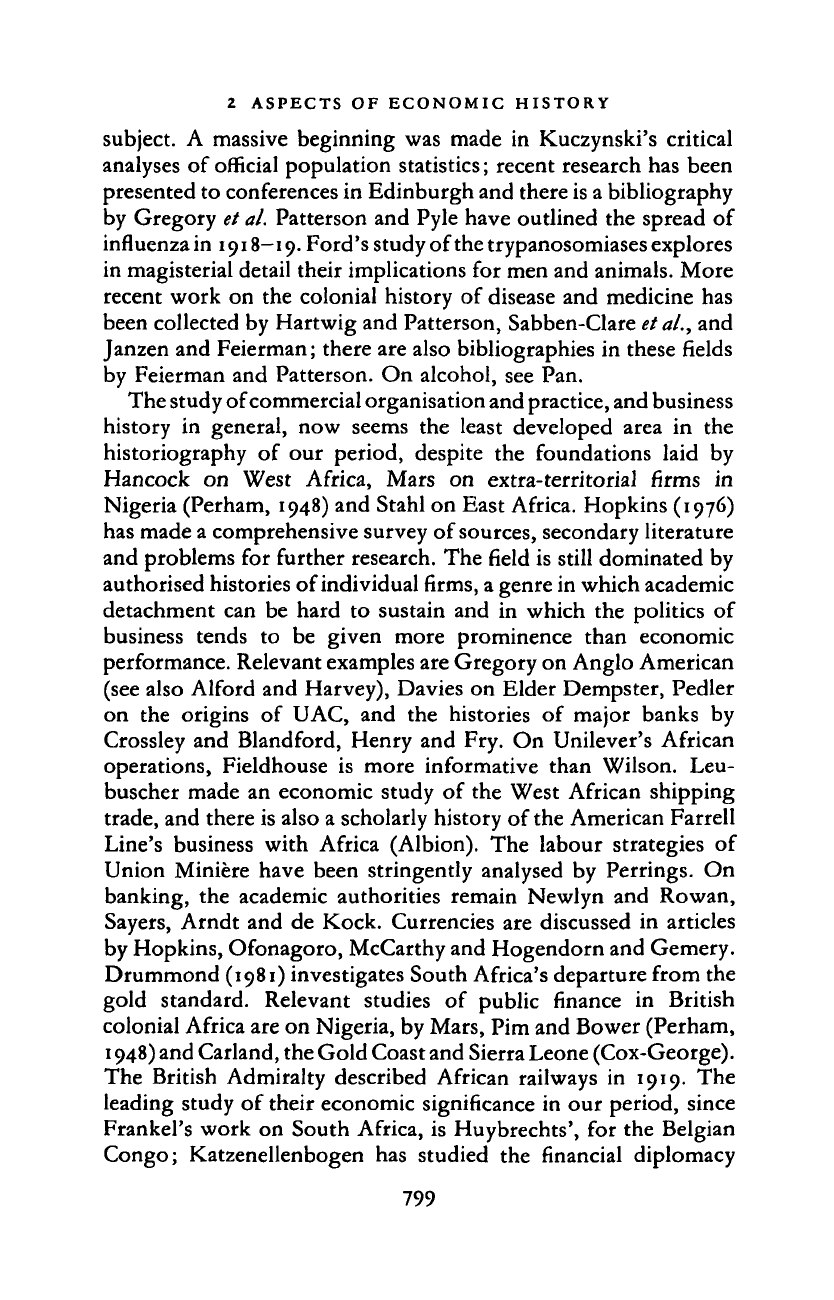
2 ASPECTS OF ECONOMIC HISTORY
subject.
A
massive beginning was made
in
Kuczynski's critical
analyses of official population statistics; recent research has been
presented to conferences in Edinburgh and there is a bibliography
by Gregory et
al.
Patterson and Pyle have outlined the spread of
influenza in 1918-19. Ford's study of the trypanosomiases explores
in magisterial detail their implications for men and animals. More
recent work on the colonial history of disease and medicine has
been collected by Hartwig and Patterson, Sabben-Clare
et
al.,
and
Janzen and Feierman; there are also bibliographies in these fields
by Feierman and Patterson. On alcohol, see Pan.
The study of commercial organisation and practice, and business
history
in
general, now seems
the
least developed area
in the
historiography
of
our period, despite
the
foundations laid
by
Hancock
on
West Africa, Mars
on
extra-territorial firms
in
Nigeria (Perham, 1948) and Stahl on East Africa. Hopkins (1976)
has made a comprehensive survey of sources, secondary literature
and problems for further research. The field is still dominated by
authorised histories of individual firms, a genre in which academic
detachment can be hard
to
sustain and
in
which the politics
of
business tends
to be
given more prominence than economic
performance. Relevant examples are Gregory on Anglo American
(see also Alford and Harvey), Davies on Elder Dempster, Pedler
on
the
origins
of
UAC,
and the
histories
of
major banks
by
Crossley and Blandford, Henry and Fry. On Unilever's African
operations, Fieldhouse
is
more informative than Wilson. Leu-
buscher made an economic study
of
the West African shipping
trade, and there is also a scholarly history of the American Farrell
Line's business with Africa (Albion). The labour strategies
of
Union Miniere have been stringently analysed by Perrings.
On
banking, the academic authorities remain Newlyn and Rowan,
Sayers, Arndt and de Kock. Currencies are discussed
in
articles
by Hopkins, Ofonagoro, McCarthy and Hogendorn and Gemery.
Drummond (1981) investigates South Africa's departure from the
gold standard. Relevant studies
of
public finance
in
British
colonial Africa are on Nigeria, by Mars, Pirn and Bower (Perham,
1948)
and Carland, the Gold Coast and Sierra Leone (Cox-George).
The British Admiralty described African railways
in
1919. The
leading study of their economic significance in our period, since
Frankel's work on South Africa,
is
Huybrechts', for the Belgian
Congo; Katzenellenbogen has studied
the
financial diplomacy
799
Cambridge Histories Online © Cambridge University Press, 2008
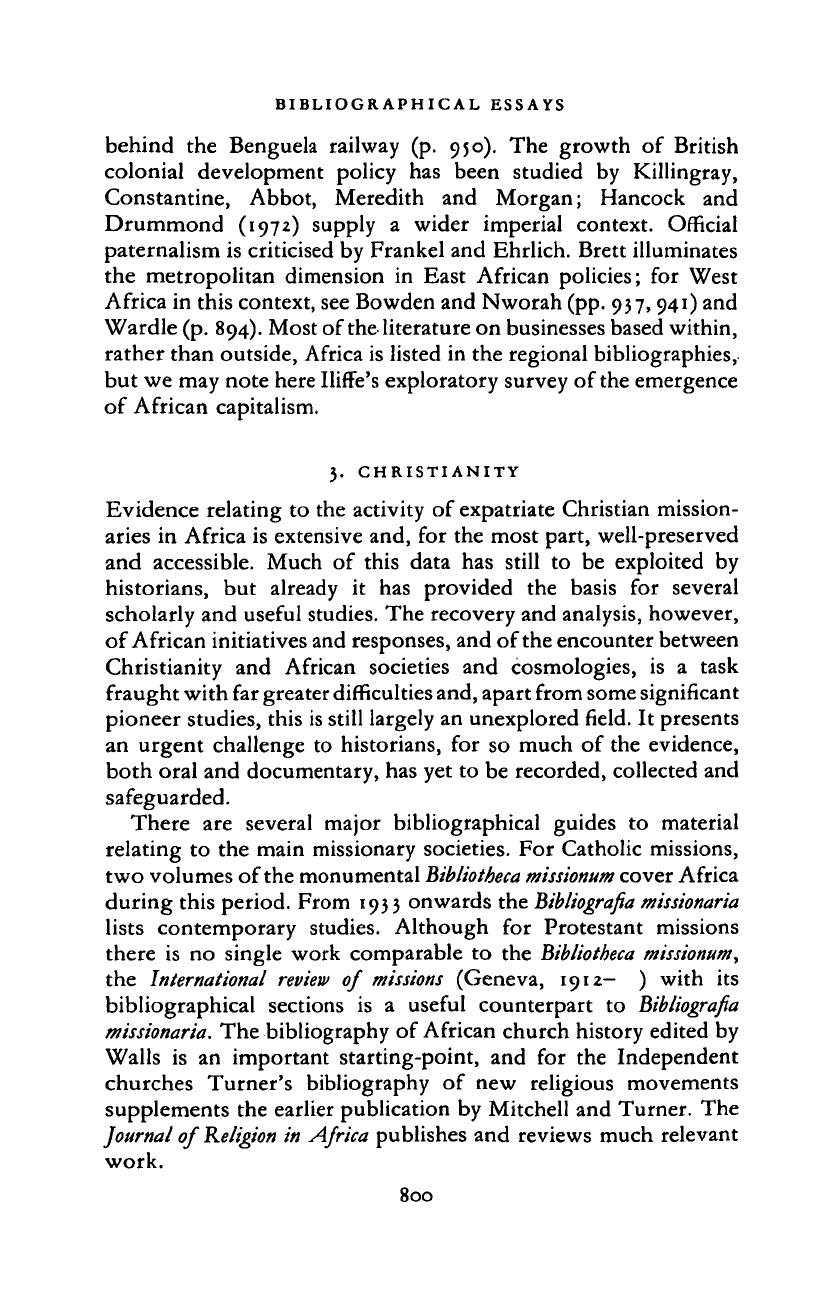
BIBLIOGRAPHICAL ESSAYS
behind the Benguela railway (p. 950). The growth
of
British
colonial development policy has been studied
by
Killingray,
Constantine, Abbot, Meredith
and
Morgan; Hancock
and
Drummond (1972) supply
a
wider imperial context. Official
paternalism is criticised by Frankel and Ehrlich. Brett illuminates
the metropolitan dimension
in
East African policies;
for
West
Africa in this context, see Bowden and Nworah (pp. 937, 941) and
Wardle (p. 894). Most of the literature on businesses based within,
rather than outside, Africa is listed in the regional bibliographies,
but we may note here Iliffe's exploratory survey of
the
emergence
of African capitalism.
3.
CHRISTIANITY
Evidence relating to the activity of expatriate Christian mission-
aries in Africa is extensive and, for the most part, well-preserved
and accessible. Much
of
this data has still
to
be exploited
by
historians,
but
already
it
has provided
the
basis
for
several
scholarly and useful studies. The recovery and analysis, however,
of African initiatives and responses, and of the encounter between
Christianity and African societies and cosmologies,
is a
task
fraught with far greater difficulties and, apart from some significant
pioneer studies, this is still largely an unexplored field. It presents
an urgent challenge to historians, for so much of the evidence,
both oral and documentary, has yet to be recorded, collected and
safeguarded.
There
are
several major bibliographical guides
to
material
relating to the main missionary societies. For Catholic missions,
two volumes of the monumental
Bibliotheca missionum
cover Africa
during this period. From 1933 onwards the
Bibliografia missionaria
lists contemporary studies. Although
for
Protestant missions
there
is
no single work comparable to the
Bibliotheca
missionum,
the International review
of
missions (Geneva, 1912-
)
with
its
bibliographical sections
is a
useful counterpart
to
Bibliografia
missionaria.
The bibliography of African church history edited by
Walls
is an
important starting-point, and
for
the Independent
churches Turner's bibliography
of
new religious movements
supplements the earlier publication by Mitchell and Turner. The
Journal
of
Religion
in Africa publishes and reviews much relevant
work.
800
Cambridge Histories Online © Cambridge University Press, 2008
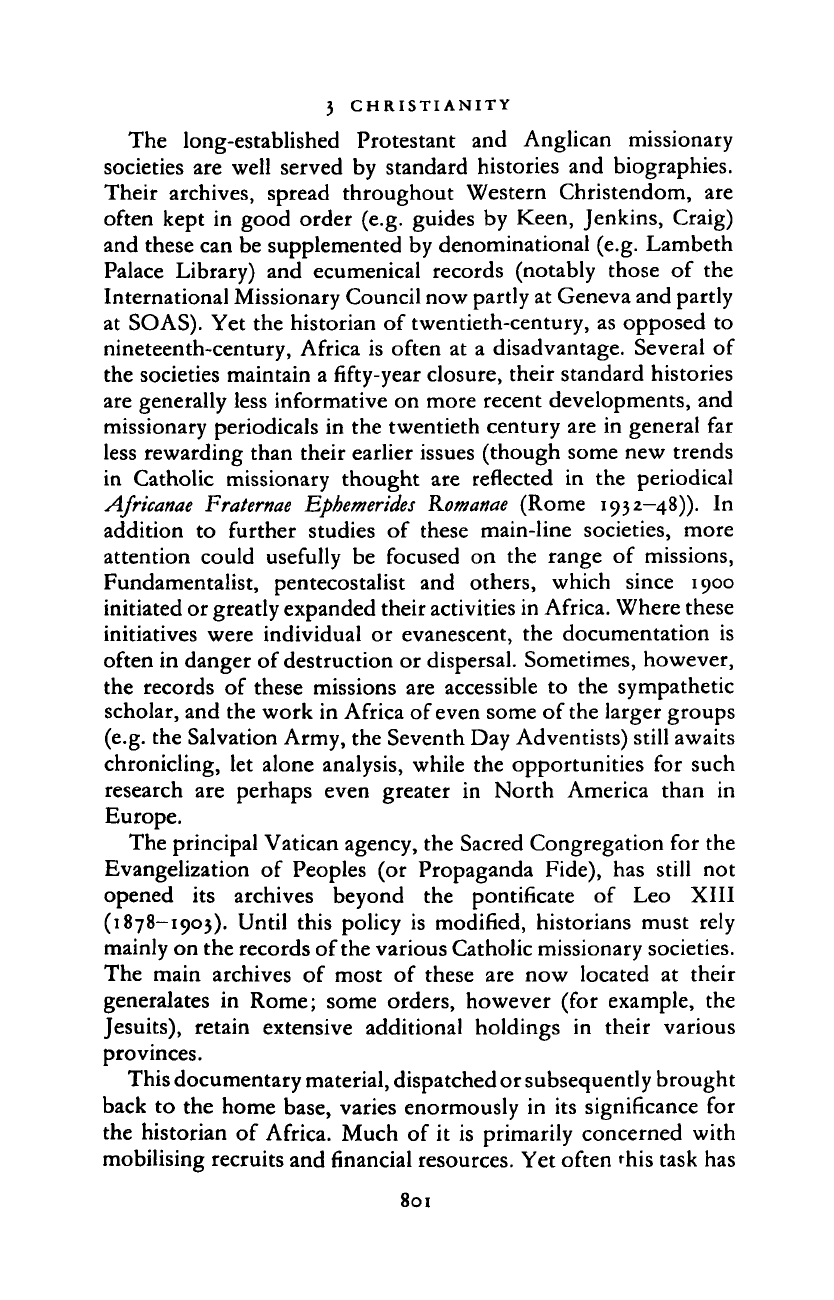
3 CHRISTIANITY
The long-established Protestant
and
Anglican missionary
societies are well served by standard histories and biographies.
Their archives, spread throughout Western Christendom,
are
often kept in good order (e.g. guides by Keen, Jenkins, Craig)
and these can be supplemented by denominational (e.g. Lambeth
Palace Library) and ecumenical records (notably those
of
the
International Missionary Council now partly at Geneva and partly
at SOAS). Yet the historian of twentieth-century, as opposed to
nineteenth-century, Africa is often at a disadvantage. Several of
the societies maintain a fifty-year closure, their standard histories
are generally less informative on more recent developments, and
missionary periodicals in the twentieth century are in general far
less rewarding than their earlier issues (though some new trends
in Catholic missionary thought are reflected
in
the periodical
Africanae Fraternae Epbemerides Komanae (Rome 1932—48)).
In
addition
to
further studies
of
these main-line societies, more
attention could usefully
be
focused
on
the range
of
missions,
Fundamentalist, pentecostalist
and
others, which since
1900
initiated or greatly expanded their activities in Africa. Where these
initiatives were individual
or
evanescent, the documentation
is
often in danger of destruction or dispersal. Sometimes, however,
the records
of
these missions are accessible
to
the sympathetic
scholar, and the work in Africa of even some of the larger groups
(e.g. the Salvation Army, the Seventh Day Adventists) still awaits
chronicling, let alone analysis, while the opportunities for such
research are perhaps even greater
in
North America than
in
Europe.
The principal Vatican agency, the Sacred Congregation for the
Evangelization
of
Peoples (or Propaganda Fide), has still
not
opened
its
archives beyond
the
pontificate
of Leo
XIII
(1878-1903). Until this policy
is
modified, historians must rely
mainly on the records of the various Catholic missionary societies.
The main archives
of
most
of
these are now located
at
their
generalates
in
Rome; some orders, however (for example, the
Jesuits), retain extensive additional holdings
in
their various
provinces.
This documentary material, dispatched or subsequently brought
back to the home base, varies enormously in its significance for
the historian
of
Africa. Much of it is primarily concerned with
mobilising recruits and financial resources. Yet often 'his task has
801
Cambridge Histories Online © Cambridge University Press, 2008
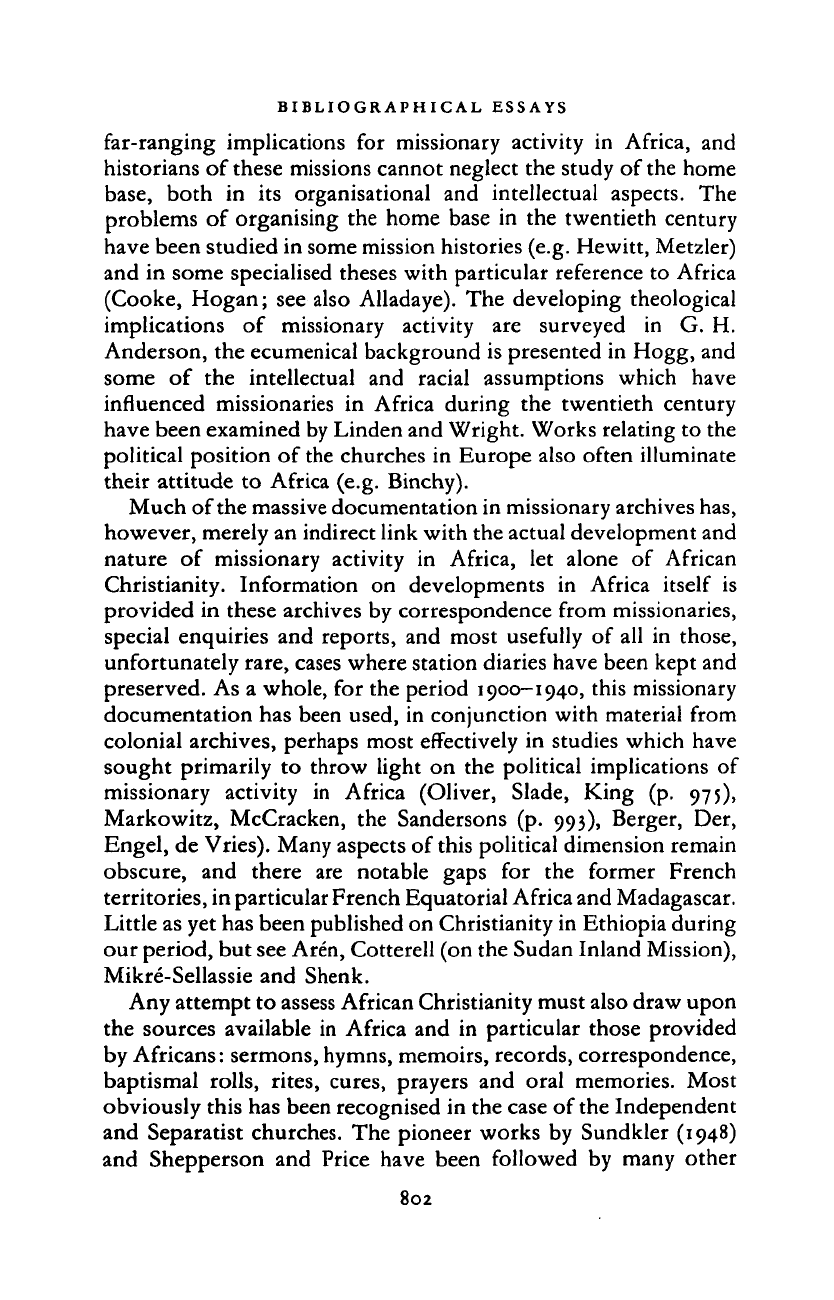
BIBLIOGRAPHICAL ESSAYS
far-ranging implications
for
missionary activity
in
Africa, and
historians of these missions cannot neglect the study of the home
base,
both
in its
organisational
and
intellectual aspects.
The
problems
of
organising the home base
in
the twentieth century
have been studied in some mission histories (e.g. Hewitt, Metzler)
and in some specialised theses with particular reference to Africa
(Cooke, Hogan; see also Alladaye). The developing theological
implications
of
missionary activity
are
surveyed
in
G.
H.
Anderson, the ecumenical background is presented in Hogg, and
some
of
the intellectual
and
racial assumptions which have
influenced missionaries
in
Africa during the twentieth century
have been examined by Linden and Wright. Works relating to the
political position of the churches in Europe also often illuminate
their attitude to Africa (e.g. Binchy).
Much of the massive documentation in missionary archives has,
however, merely an indirect link with the actual development and
nature
of
missionary activity
in
Africa,
let
alone
of
African
Christianity. Information
on
developments
in
Africa itself
is
provided in these archives by correspondence from missionaries,
special enquiries and reports, and most usefully of all
in
those,
unfortunately rare, cases where station diaries have been kept and
preserved. As a whole, for the period 1900-1940, this missionary
documentation has been used, in conjunction with material from
colonial archives, perhaps most effectively in studies which have
sought primarily
to
throw light on the political implications of
missionary activity
in
Africa (Oliver, Slade, King
(p.
975),
Markowitz, McCracken, the Sandersons (p. 993), Berger, Der,
Engel, de Vries). Many aspects of this political dimension remain
obscure,
and
there
are
notable gaps
for the
former French
territories, in particular French Equatorial Africa and Madagascar.
Little as yet has been published on Christianity in Ethiopia during
our period, but see Aren, Cotterell (on the Sudan Inland Mission),
Mikre-Sellassie and Shenk.
Any attempt to assess African Christianity must also draw upon
the sources available in Africa and
in
particular those provided
by Africans: sermons, hymns, memoirs, records, correspondence,
baptismal rolls, rites, cures, prayers and oral memories. Most
obviously this has been recognised in the case of the Independent
and Separatist churches. The pioneer works by Sundkler (1948)
and Shepperson and Price have been followed
by
many other
802
Cambridge Histories Online © Cambridge University Press, 2008
